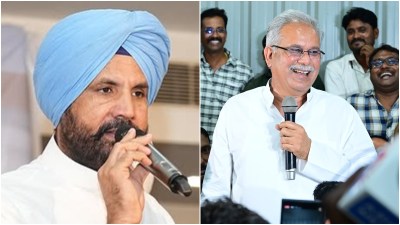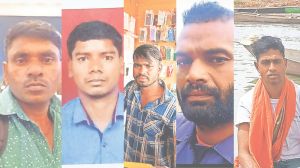Justice, before we move on
Cancun conqueror, Union Law Minister Arun Jaitley, seized the moment with characteristic legal panache. Dismissing the charges made against ...

Cancun conqueror, Union Law Minister Arun Jaitley, seized the moment with characteristic legal panache. Dismissing the charges made against Union HRD Minister Murli Manohar Joshi and six others by the Rae Bareli court, he pronounced that it was 8220;only a case of an unlawful assembly and Section 153 and not a case of moral turpitude or corruption8221;.
He makes the crimes committed by the sangh parivar8217;s Seven Samurai 8212; the Eighth having ridden into the sunset to the music of the spheres after having escaped the noose of the law for now 8212; sound like minor traffic offences. Jaitley is, of course, entitled to his point of view but perhaps he should be reminded that this case of 8220;unlawful assembly8221; is not about a group of picnickers raising anti-social slogans. It was the end result of years of hate politics that caused deep social fissures.
This 8220;unlawful assembly8221; did not just bring down an old mosque, it caused the deaths of some 1,000 people, forced 2 lakh to flee their homes, resulted in the destruction of 10,000 homes and led to a loss of over Rs 1,700 crore in terms of economic activity, as the Mumbai-based Urban Development Institute has documented. As for the damage done to India8217;s secular democracy, that would be impossible to compute because we continue to pay the price for it to this day.
Perhaps Jaitley would like us to forget all this and move on. Mass amnesia is useful for two reasons. Not only does it blunt the shards of public shock, anger and despair, it makes individual culpability so much fuzzier. Incidentally, Jaitley8217;s good friend, Gujarat Chief Minister Narendra Modi, also wants his state to move on, make lots of money and become 8220;vibrant8221; once again. The Shiv Sena-BJP government made a similar plea when it scuttled the Srikrishna Commission on the Mumbai riots/blasts in 1996: Hindus and Muslims are living in peace and the Commission is only reopening old wounds, so let8217;s wind it up and get on with life, it argued.
Interestingly, the 8220;let8217;s move on8221; school of thought hinges its argument on the inevitability of pogroms and riots, ending up ultimately in justifying them. Shiv Sena henchman and riot-accused, Madhukar Sarpotdar, argued before the Srikrishna Commission that 8220;the killing of innocents in a remote area in retaliation for the killing of innocents elsewhere was justified and natural8221;.
It was the same logic Narendra Modi had advanced last March, even as the killings in his state went on apace. Then there is that quotable quote from Rajiv Gandhi, with regard to the anti-Sikh riots that followed his mother8217;s death: When a big tree falls there are bound to be some tremors.
In other words, so what if 2,733 people got killed? Let8217;s move on. There would be many who find the 8220;let8217;s move on8221; line of reasoning compelling, even if they find riots in themselves appalling. What has happened, has happened, they will say. Now that there is peace, let8217;s forget the past and move on, because there are so many important things to do. Memory is, indeed, an encumbrance in this 8220;distracted globe8221;.
But there are crucial reasons why the law should take its course, why the judicial process must not become a casualty of politics or executive will. For one, it plays a pivotal role in a democracy.
The late American philosopher John Rawls in his work entitled, A Theory of Justice, believed that a shared conception of justice and equality was the basis of social cooperation. It would be impossible, he argued, for people from diverse backgrounds and with different aims and purposes, to exist together in a society if they were not endowed with 8220;two moral powers8221; 8212; the capacity for a sense of 8220;justice8221; and an idea of the 8220;good8221;.
These together make 8220;fair cooperation8221; within society possible. Rawls considers a 8220;well-ordered society8221; as one that is not only designed to advance the good of its members but one that is regulated by a public conception of justice. This conception of justice goes beyond individuals to inform the working of social institutions.
The framers of the Indian Constitution may not have read Rawls, but they nevertheless gave justice top billing. Justice 8212; 8220;social, economic and political8221; 8212; was the first promise made to the citizens of this country in the Preamble to the Constitution.
Animating that promise has become Indian democracy8217;s single biggest challenge. The Sixth Report of the National Police Commission recognised the enormity of the task: 8220;Once the law-abiding citizen doubts the capability of the law to protect him, he is likely to seek other avenues for protection and thus a person who should
normally be a counter rioter is pushed by injudicious action into the very vortex of the riot8230; The investigation and successful prosecution of a crime prevents further crimes and discourages potential criminals. It also restores the confidence of the people in the rule of law.8221;
The abyss stares us in the face. Every time, a minister of law undermines a judicial verdict and defends a guilty party colleague, every time the counsel of a state government justifies its failure to deliver justice, we come closer to that abyss.
Some ten days ago, the counsel for the Gujarat state government actually argued before the Supreme Court that what happened in the Best Bakery Case should cause no surprise given the 8220;shortcomings8221; in India8217;s criminal justice system which have resulted in rioters being let off the hook over the last 40 years.
Fortunately, Chief Justice V.N. Khare was quick to catch the drift of his argument. 8220;Do you mean to say the rioters in Gujarat should also be acquitted?8221; he asked. That was exactly what the counsel had meant but the chief justice would, of course, have none of it. As he reminded the unfortunate man: 8220;You have to protect the people and punish the guilty. What else is rajdharma? You quit if you cannot prosecute the guilty.8221;
In this season of judicial interventions involving a whole battery of communal crimes, whether it is the Supreme Court8217;s observations in the Best Bakery Case, or the Khurda district court8217;s sentencing of Dara Singh and his accomplices in the killing of Graham Staines and his two sons, or indeed the Rae Bareli verdict on Ayodhya, it would be useful to reiterate a basic principle. That in a democracy, justice is non-negotiable.
- 01
- 02
- 03
- 04
- 05































